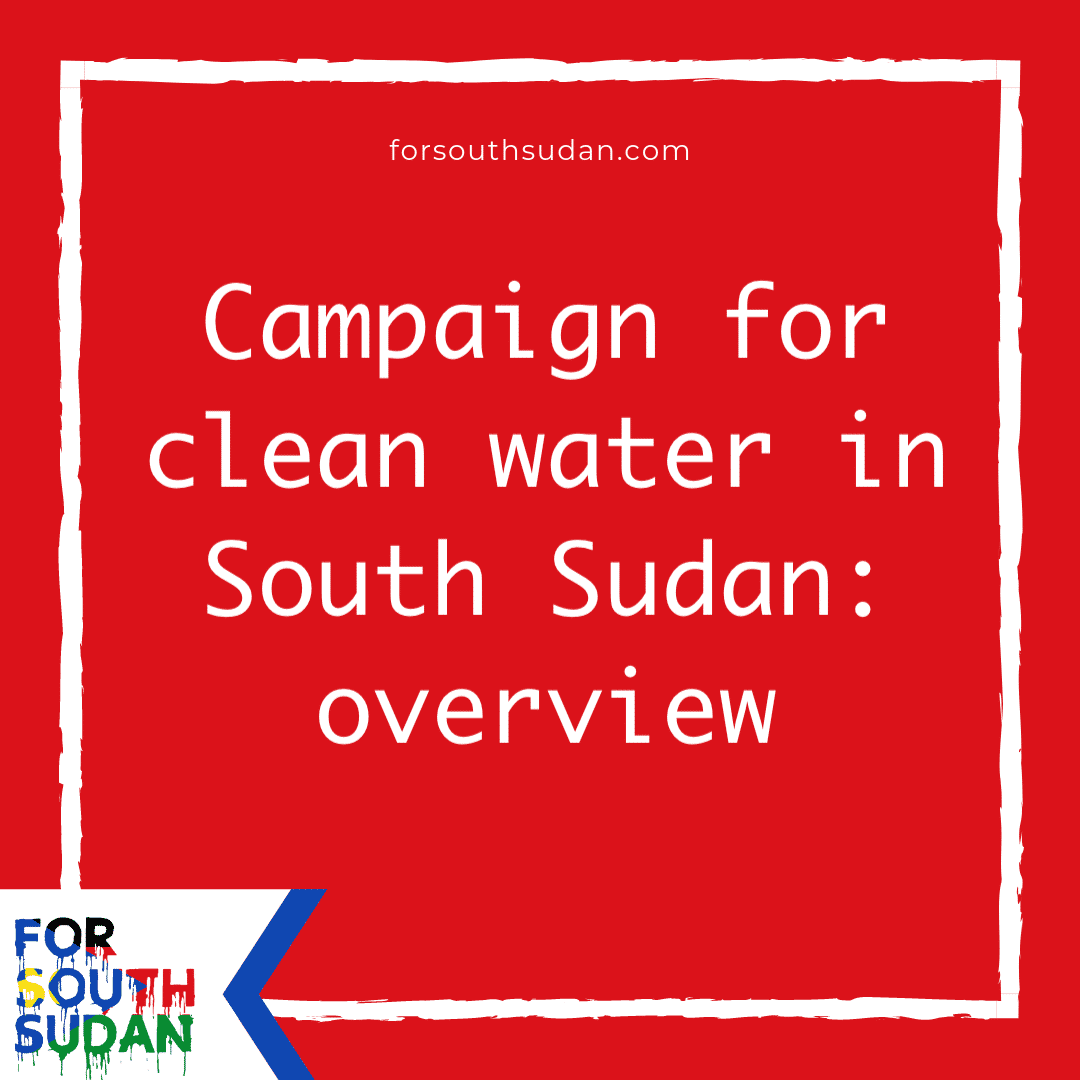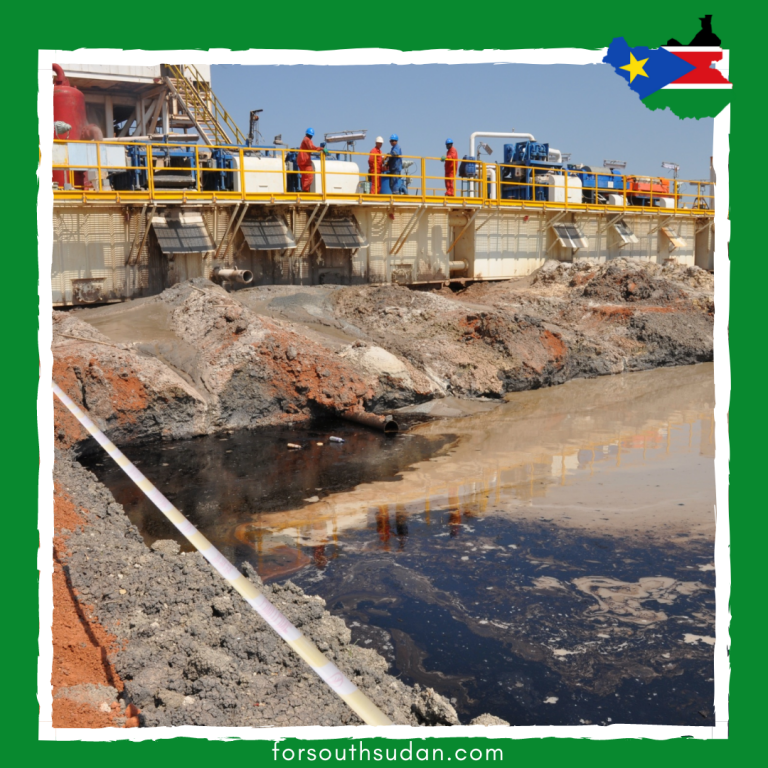Clean Water for South Sudan
Campaign
Since 2008:
Campaign for the rights of the South Sudanese to clean water, for a healthful environment, and for lives of prosperity and dignity
Campaign against the “eco-cide” being perpetuated by oil companies and their allies in the government of South Sudan – and against the poisoning of environment and lives by oil spills, wastes, leaks, fires and chemicals.
A sheer unimaginable amount of pollution….
Last two decades:
1.36 trillion liters of produced (poisoned) water containing a total of 8.31 million tons of salt;
7.90 billion liters of oil well drilling fluids containing a total of 1.18 tons of chromium, 12.05 tons of lead, 2.53 tons of nickel, 1.39 tons of cadmium, and 437,806.88 tons of salt
At least six million (6,000,000) liters of crude oil spilled.
…. comprised of a wide variety of ultra-toxic materials
Crude oil, produced water, drilling fluids and ultra-poisonous chemicals and the minerals (lead) leached from the subsoil by them.
A horrifying large number of victims….
At least 600,000 in South Sudan’s oil regions alone, states German NGO Sign of Hope.
2.3 million children in South Sudan are lead poisoned – from oil pollution, states UNESCO.
….with deadly and shocking ailments:
Stillbirths. Infant deformities. Mentally and physically crippled children. Infertile women. Impotent men. People living with and dying from an epidemic of cancer, skin rashes, liver and kidney malfunctions, cardiovascular problems and much more.
Oil pollution in South Sudan – where it’s coming from….
Ruptures of and leaks from dilapidated pipelines and obsolete or derelict processing facilities (and fires at the latter); seepage of produced water and other toxic fluids from inadequate, badly-maintained or non-existent treatment facilities; abandoned or badly-secured stocks of deadly chemicals.
…and where it’s going
Into aquifers, and from there, poisoning of ground water – and thus, via wells, consumption by humans and animals, and dispersion on to farmland.
Into rivers and other bodies of water – including the Nile and the Sudd – one of the world’s largest and most biodiverse wetlands
Oil pollution in South Sudan – how it’s destroying human health – the evidence
https://www.sciencedirect.com/science/article/pii/S0379073816305540
https://apnews.com/article/f2f06cfa70126ad179445720d7c60b8a
Campaign for clean water in South Sudan: the people
Residents of oil regions, who have been overcoming hunger, destitution and oppression to assert their rights and interests in peaceful protests
https://forsouthsudan.com/young-protesters-in-south-sudan-defy-government-led-intimidation-we-will-take-the-fight-against-oil-pollution-to-the-courts Whistleblowers who have risked their lives and livelihoods to tell the world the horrific dimensions of oil pollution in South Sudan
South Sudanese environmental and human rights organizations that have been investigating and reporting on oil pollution and its effects
including the Sudd Institute
https://www.suddinstitute.org/publications/show/600ec18816c27
Attorneys bringing lawsuits on behalf of the victims of South Sudan
including Wani Santino Jada and his worldwide precedent-setting suits at the East African Court of Justice
https://forsouthsudan.com/on-behalf-of-the-people-of-south-sudan-wani-santino-jada-the-peoples-attorney Front-line journalists:
WeAreWitness – reporting via forsouthsudan.com
Groups of socially-concerned artists
including Anataban
International NGOs and organizations
including notably the Germany-headquartered Sign of Hope
https://www.hoffnungszeichen.de/english
Campaign for clean water in South Sudan: successes
Created body of evidence scientifically demonstrating the existence and effects of oil pollution upon human and environmental health
Attracted and focused the world’s attention on South Sudan – series of articles appearing in Associated Press in February 2020 had 150 million reads and views
Forced government to admit that oil pollution constitutes a huge and urgent problem – and to do such at sessions of UN and other international bodies
Mobilized people of South Sudan to stand up for their rights to clean water and healthy lives
Helped form networks comprised of activists, CSOs (civil society organizations) and media by providing them with a platform – forsouthsudan.com – for their reports and views
Helped force government to live up to its promises to conduct comprehensive audit of country’s environment and society
Helped attorneys lodge lawsuits on behalf of people of South Sudan in international courts of justice – lawsuits with the potential to get compensation for the victims and to put an end to the Black Tide of oil pollution
Campaign for clean water in South Sudan: challenges
No noticeable improvement in lives of victims of South Sudanese: still lacking clean water, adequate medical treatment, remediation of farmlands and of villages contaminated with poisonous materials
No abatement of issuance of oil pollution into environment, and thus a further deterioration of human and environmental health, with the Nile and the vast Sudd wetlands also being affected
No change in government’s track record of failing to keep promises and of ignoring laws and regulations – this could also apply to audit currently being carried out
Murder of two activists forming part of WeAreWitness networks; persecution and flight of other journalists and whisteblowers
Lawsuits bogged down in international courts


